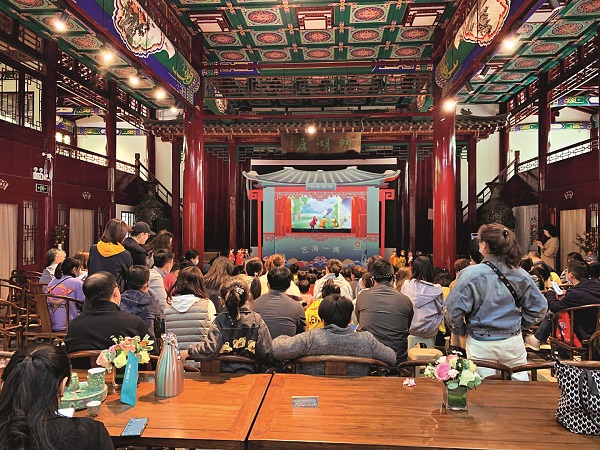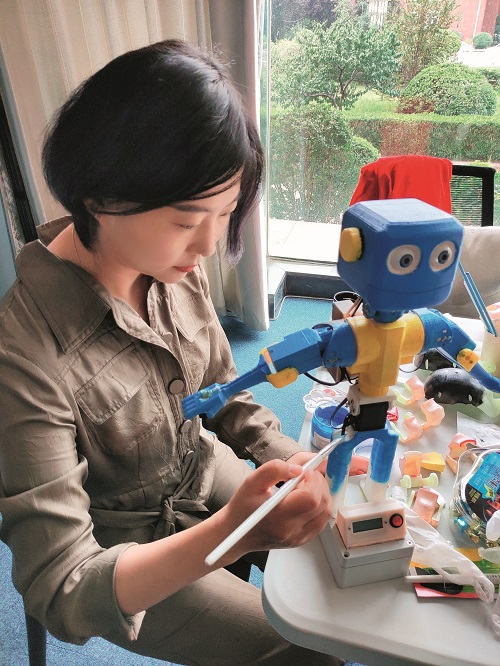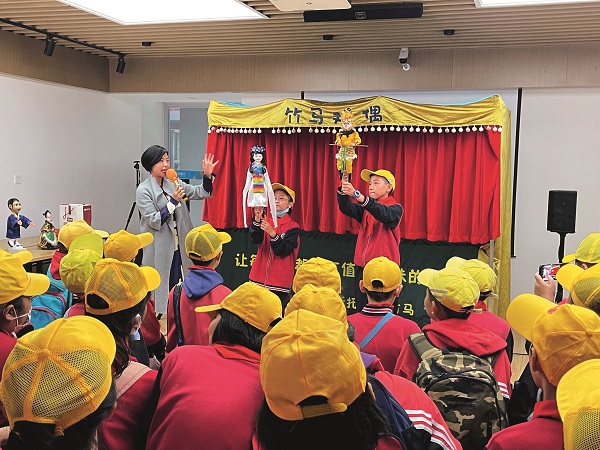'Puppet Sister' Creates 'Intelligent' Robot Performers
 |
During the past few years, puppet shows, offered by Li Xiuping's team, have been hugely popular among children. Many children have been impressed by the fascinating stories "performed" by the team's puppet robots on the automated stage. Li, a young woman from Qingzhou (a city in East China's Shandong Province), has led the employees of her company, Shandong Zhuma Culture and Technology Co. Ltd., in developing the robots and the stage. Li hopes children will not only have a better understanding of the unique charm of the art form, but they will also learn stories, integrated with traditional Chinese elements, by watching the puppet shows.
Puppet shows in China originated during the Han Dynasty (206 BC-220 AD), and flourished during the Tang Dynasty (618-907). In May 2006, the art form (puppet show) was listed among the first group of elements designated as national intangible cultural heritage. Many master craftspeople believe inheritors (of the puppet show) should not only inherit and promote the traditional cultural heritage, but they should also improve and innovate the performing art.
In 1986, Li was born into a farmer's family in Qingzhou. She enjoyed watching puppet shows when she was a little girl. After she grew into a young woman, she learned, from a craftsman (in Qingzhou), how to create and manipulate puppets. As an inheritor of the art form, Li felt obliged to promote the development of the traditional art form.
As she realized a traditional puppet show required both manpower and financial resources, Li in 2017 brainstormed, and she came up with a good idea to enhance her puppet shows: Use program-controlled robots to replace puppets. She and her husband, Su Weixing, studied how to use robot-related technologies to develop "portable" puppets.
More than three years later, and after numerous analyses and tests, Li eventually made the miracle complete. She breathed new lives into the robots, which suddenly could make various facial expressions and postures. Li was thrilled as she watched the robots, whose bodies were implanted with chips, move nimbly on stage.
 |
Around the same time, Li created a "portable" stage, the materials of which could be put into suitcases, contained in her car's trunk, and transported to performance venues. Through their experiences, Li and her employees have realized that using the stage and robots is both convenient and time-saving. Why? Traditionally, it requires six or seven people to build a stage, and to manipulate the puppets. By using the "intelligent" robots and "portable" stage, however, one or two people are sufficient to put on a show.
Li, the mother of an 11-year-old boy, hopes children will spend more time (with their parents) watching puppet shows rather than wasting too much time playing online games and/or watching online videos. Li also hopes children will make friends, as they watch a show, and/or learn — from Li's team — how to create and/or manipulate puppets.
During the past several years, Li has led her team in staging puppet shows, created by the team, throughout the country. Li has also led her team in performing, free of charge, the shows in schools and communities in various regions of the country. The plays have been well received, and Li's fans have taken to calling her "Puppet Sister."
Li recently told media she will lead her team in creating more, and better, plays to promote the development of the traditional art form (puppet show).
 |
Photos Supplied by the Interviewee
(Women of China English Monthly January 2022 issue)
Please understand that womenofchina.cn,a non-profit, information-communication website, cannot reach every writer before using articles and images. For copyright issues, please contact us by emailing: website@womenofchina.cn. The articles published and opinions expressed on this website represent the opinions of writers and are not necessarily shared by womenofchina.cn.






.jpg)

 WeChat
WeChat Weibo
Weibo 京公网安备 11010102004314号
京公网安备 11010102004314号